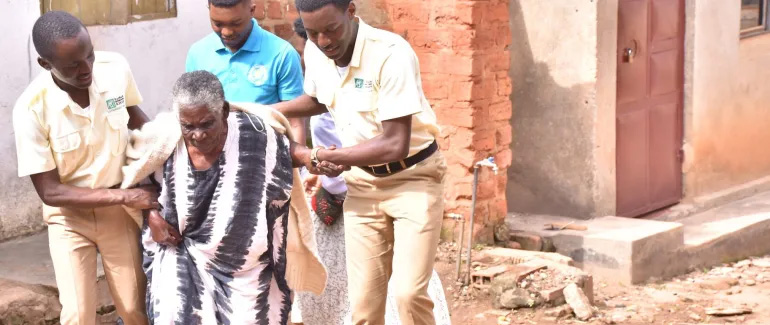On the 8th of May, the World Health Organization (WHO) hosted a webinar, “Long-term Care for Older People: Package for Universal Health Coverage. A contribution to the UN Decade of Healthy Aging.” This webinar “aimed at guiding towards the integration of long-term care into universal health coverage.” It highlighted long-term care professionals from six countries: Ireland, Singapore, South Africa, Denmark and the Republic of Korea in addition to our own representative from Uganda, Mark Mwesiga, executive director of the Palliative Care Association of Uganda (PCAU). The speakers shared examples of programs and interventions from their countries and shed light on the lived experiences of older people, their caregivers and the healthcare workers who tend to them.
In this webinar, Mwesiga explained how PCAU’s goal is to advocate for and support the integration of palliative care into Uganda’s health care system. He shared 2023 statistics representing palliative care’s rapid growth in the country and highlighted the inclusion of palliative care in the overarching national health policy and Uganda National Minimum Healthcare Package (UNMHCP). Palliative care is offered in 300 hospitals and hospices in 80% of the 146 districts across Uganda in inpatient and outpatient care, community outreach, roadside clinics and home care.

Mwesiga elaborated on the state of palliative care in Uganda by detailing home visits specifically. While conducting home visits, the palliative care team, composed of a health worker, social worker and spiritual caregiver, will travel miles to meet with patients, caregivers and their families. How often a patient is seen depends on their individual needs. On average, palliative care patients in Uganda are visited once a month. Patients at the end of life can be visited more frequently for medication refills and psychosocial support, which is given to the patient and their caregivers. The community-based volunteers, who are mainly non-medical workers with basic palliative care education, stay in the patient’s village and will contact the palliative care team whenever it is important for the team to visit again, making the community-based volunteer a vital component of homecare in Uganda. Palliative care teams see patients of all ages, but most are over 60 years old and suffer from incurable diseases. Uganda registers 35,000 new cancer cases and over 24,000 cancer-related deaths annually.

While older persons account for only 4.3% of Uganda’s population – making it the second youngest population in the world – they are the cornerstone of Ugandan society. Almost half of older persons in Uganda live in poverty in rural areas and face significant health conditions. Many older persons lack health insurance and are unable to pay out-of-pocket for health care. Given these issues, the lack of standalone home care programs and the hefty expense of transporting palliative care teams over rough roads, accessing palliative care in Uganda remains difficult. Compounding these issues is the ongoing decrease of donor funding for palliative care work. Additionally, there are few health and social workers trained in caring for older persons. This is another threat to accessing quality care and demonstrates a further need for funding.
Mwesiga concluded by explaining the ways in which long-term care for older persons can help address these challenges. PCAU’s solutions include strengthening the integration of long-term care, which Mwesiga suggested should be led by the government. He also noted that Uganda’s ability to build on existing structures is critical in improving the quality of life for older persons and their caregivers. PCAU is taking initiatives to spearhead long-term care for older people, including working with like-minded organizations and seeking more partners and donors to support this important work. In his final remarks, Mwesiga summed up his address with a call to action: “As we say, ‘palliative care is everyone’s business,’ and long-term care is everyone’s business, too.”
